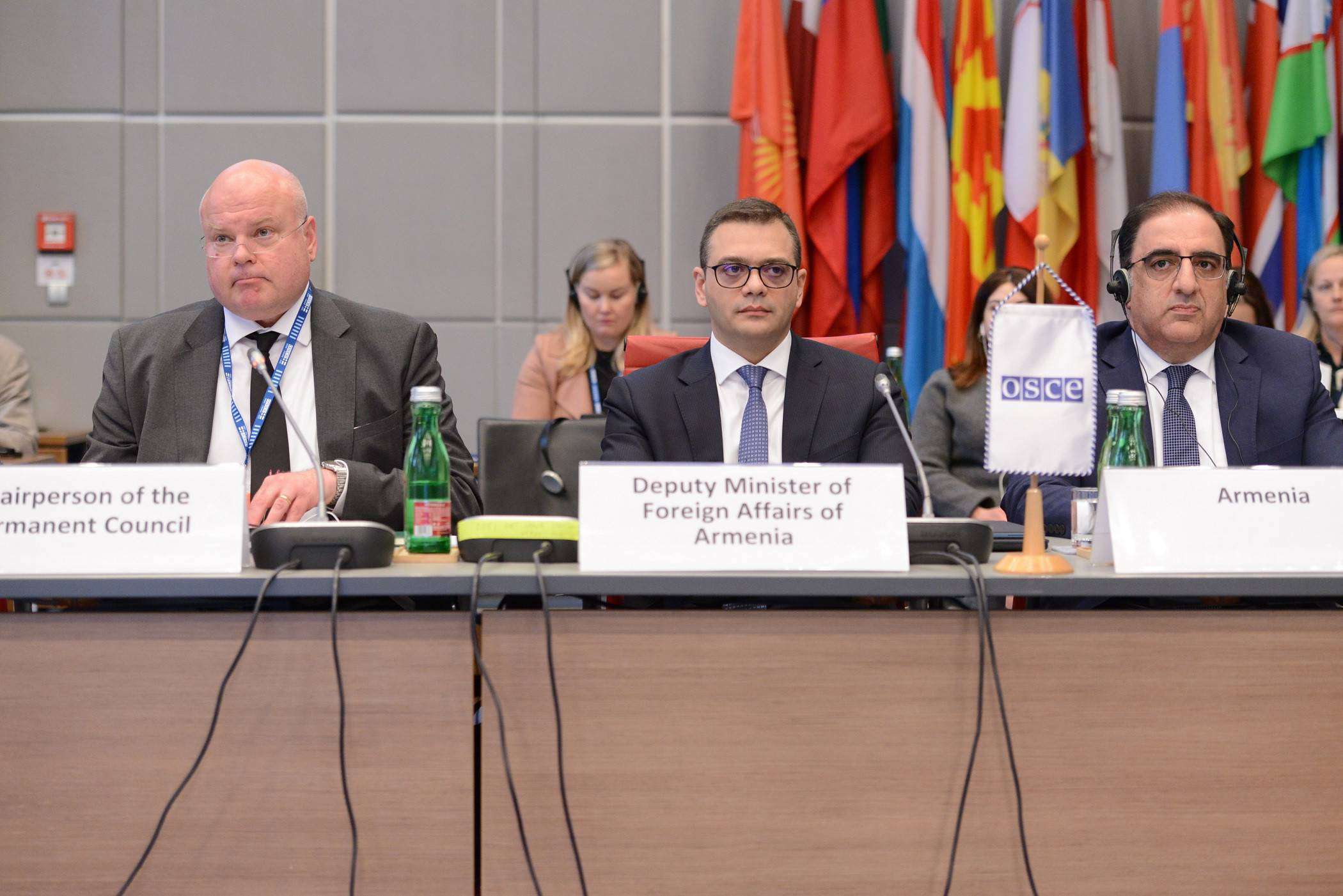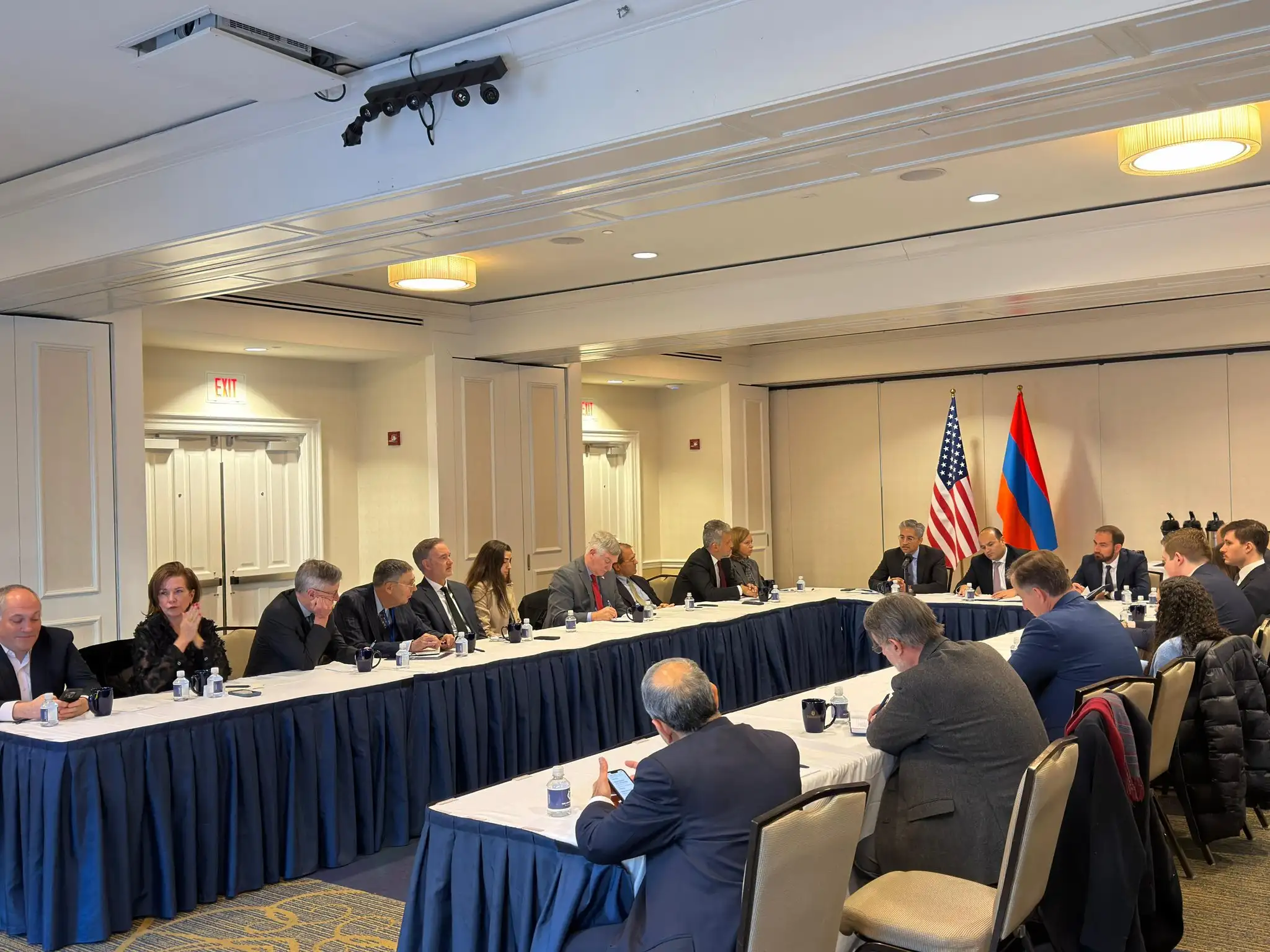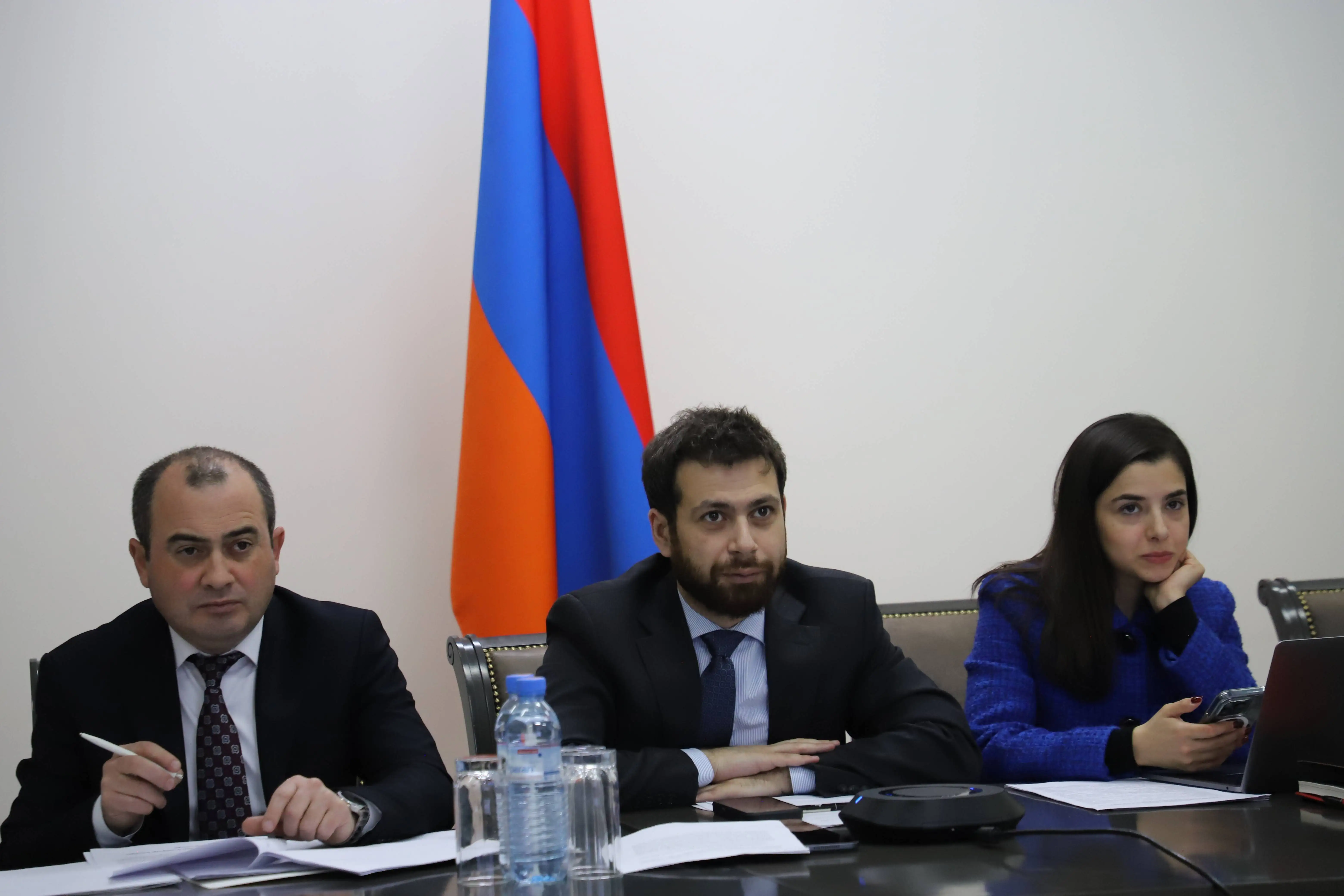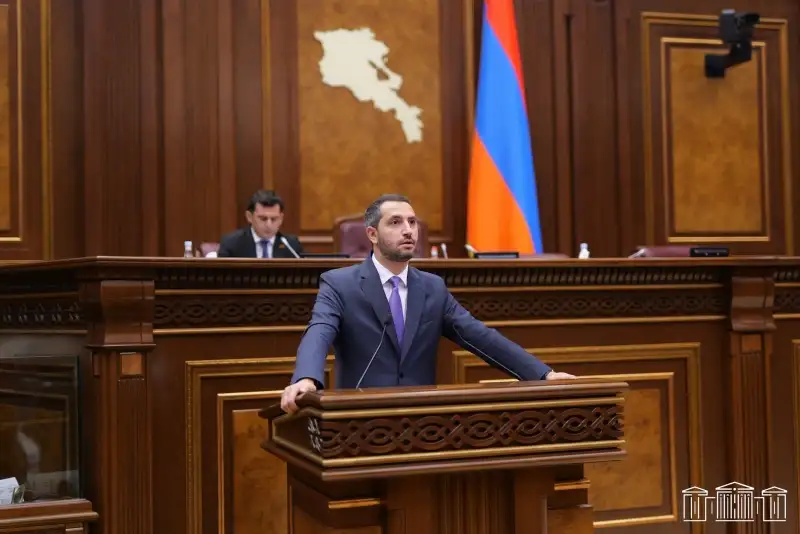On March 26, Deputy Foreign Minister of the Republic of Armenia Robert Abisoghomonyan delivered a speech in Vienna at a special session of the OSCE Permanent Council convened at Armenia's request.
Representatives of delegations of about two dozen OSCE participating states also delivered speeches during the session, mainly welcoming the Agreement on the text of the Peace Agreement between Armenia and Azerbaijan and the completion of negotiations on it and calling for its early signing and ratification. The Deputy Foreign Minister of the Republic of Armenia noted in his speech:
"I would like to thank the Finnish Chairmanship for convening a special session of the Permanent Council. It is a great honor for me to return to the OSCE, especially on this important occasion, to inform the OSCE participating states that the text of the "Agreement on the Establishment of Peace and Interstate Relations between the Republic of Armenia and the Republic of Azerbaijan" has been agreed upon. Negotiations on the draft Agreement have been completed.
After three years of intensive negotiations, on March 13, 2025, Armenia agreed to the final version of the Agreement and informed the Azerbaijani side of this decision.
The finalization of the document is a significant step forward and a milestone that plays a decisive role in the decades-long conflict, providing a historic opportunity to pave the way for regional peace. This process has required sincere commitment to the peace agenda, tireless efforts, and strategic patience to resolve several sensitive issues and overcome initial differences.
Thus, due to all these efforts, we have finalized the draft text and are now ready to begin discussions to determine the dates and venue for the official signing. On March 20, 2025, the Prime Minister of Armenia proposed to the President of Azerbaijan to begin joint discussions on signing the agreed draft of the Peace Agreement.
Several of our international partners have welcomed these positive developments and encouraged the parties to continue their constructive engagement aimed at the early signing the Peace Agreement and registering favorable results in other areas of the peace agenda. In this context, I would like to express our gratitude to all those states, including those around this table, that have sincerely supported the negotiations, hosted the discussions, welcomed the finalization of the Agreement, contributed to this success, and continue to support lasting peace and stability in our region firmly.
To our surprise, Azerbaijan's response and subsequent actions are disappointing and alarming. With its unilateral statement, Azerbaijan acknowledges the finalization of negotiations on the text of the Peace Agreement but has also put forward artificial preconditions.
Armenia has consistently stated that resolving all the problems accumulated over decades of hostility with a single agreement is impossible. This is obvious. However, signing the Peace Agreement will create a favorable environment and pave the way for addressing and resolving all outstanding issues.
As a unilateral demonstration of Armenia's constructiveness, Azerbaijan demands the termination of the Minsk Process structures, even though the Armenian side has demonstrated its constructive approach several times during the negotiations. They also require constitutional amendments in Armenia, arguing that the Declaration of Independence of Armenia, which is referenced in the Preamble to our Constitution, includes territorial claims against Azerbaijan.
The Republic of Armenia has already expressed its position at the highest levels: We are ready to consider the termination of the OSCE Minsk Process structures. However, it is necessary to ensure that this step is consistent with the conflict's de facto and legal end. There will be no need for further activity of the Minsk Process structures once the Peace Agreement is signed, officially and institutionally recording the end of the conflict. Otherwise, this would be putting the cart before the horse. If Azerbaijan wants to end this structure's existence, the most logical and legitimate shortcut is to sign the Agreement.
As for the Constitution of Armenia, I would like to inform the participating States that on September 26, 2024, the Constitutional Court of the Republic of Armenia, within the framework of the ratification of the Regulations on the Joint Activities of the Border Commissions, adopted a decision confirming that the Regulations, including the demarcation of the border between Armenia and Azerbaijan based on the 1991 Alma-Ata Declaration, are consistent with the Constitution of the Republic of Armenia, which means that the borders existing at the time of the dissolution of the USSR The mutual recognition of territorial integrity, which is also reflected in the Agreement, is entirely consistent with the Constitution of the Republic of Armenia. Armenia has no territorial claims towards Azerbaijan. In other words, the shortest way to dispel Azerbaijan's concerns is to sign the Agreement.
Moreover, the Constitutional Court noted that those provisions of the Declaration of Independence of Armenia have constitutional force directly reflected in the articles of the Constitution of the Republic of Armenia. In contrast, those provisions of the Declaration that are not directly included in the articles of the Constitution cannot have any legal force.
Thus, let us emphasize once again that the decision of the Constitutional Court of the Republic of Armenia states that the Constitution does not contain any provision that could imply territorial claims to any third country.
The Constitution of Azerbaijan raises concerns since it contains provisions that imply territorial claims to Armenia. The Preamble to the Constitution of Azerbaijan refers to the Constitutional Act adopted by the Parliament of Azerbaijan on October 18, 1991. That Constitutional Act refers to the Declaration of Independence of the First Republic of Azerbaijan adopted in 1918, which states that the First Republic of Azerbaijan includes the Eastern and Southern Transcaucasia. In November 1919, the Republic of Azerbaijan presented its administrative-territorial map to the Entente, in which about 60 percent of the current Republic of Armenia territory was included in Azerbaijan. Thus, the Constitution of Azerbaijan contains territorial claims to the Republic of Armenia.
But in that case, why don't we raise the issue of the need to change the Constitution of Azerbaijan? The Peace Agreement includes an article in which the parties cannot refer to their internal legislation to justify the failure to fulfill the Agreement. Another article stipulates that the parties recognize each other's territorial integrity, have no territorial claims to each other, and undertake not to make such claims in the future. Moreover, both Armenia and Azerbaijan recognize each other's territorial integrity within the borders of the former Soviet republics.
Therefore, after being signed by Armenia and Azerbaijan, receiving the conclusion of the Constitutional Courts on its compliance with the Constitution, and being ratified, the Peace Agreement will have a legal force superior to any domestic law. In this regard, raising any other issue as a precondition for signing the document means, at the very least, a delay in establishing peace.
Let me also touch on Azerbaijan's disinformation campaign aimed at alleged ceasefire violations along the border. Why should Armenia prepare to use force? What agenda issue could imply the use of force by the Republic of Armenia?
Azerbaijan occupies more than 200 square kilometers of Armenia's sovereign territory. However, Armenia has unequivocally stated at the highest level that it does not seek to resolve this issue militarily. The ongoing process of demarcation and the finalized text of the Peace Agreement contain all the necessary mechanisms to address this issue peacefully and legally. Thus, Armenia is fully committed to the peace agenda and continues to act by these principles.
In this context, the Ministry of Defense of the Republic of Armenia investigates cases of alleged ceasefire violations. At the same time, being genuinely interested in building confidence in the region, we have proposed to the Azerbaijani side to create a joint mechanism for investigating ceasefire violations, as well as to apply other measures, including a mirror withdrawal of troops from border areas and a mechanism for mutual control of armaments. Unfortunately, the proposals mentioned above have not received a constructive response from Azerbaijan, which raises serious questions about the true intentions of these periodic accusations.
The accusations of Azerbaijan are not isolated cases; they are part of a clear and developed pattern of actions, according to which Azerbaijan is intensifying disinformation propaganda about alleged ceasefire violations, using it as an excuse for further tension in the region. In 2020 and 2023, the Armenian side has repeatedly brought cases of similar tactics to the attention of the OSCE participating States. My call is to be more attentive to the regularity of these actions. The deliberate spread of false information and baseless accusations of ceasefire violations are not simply attempts to distort the truth; they are worrying signs of a possible military escalation. We must be vigilant against this tactic, redoubling our efforts to establish regional peace and stability.
The recent escalation of rhetoric and increasing threats against Armenia also continue this worrying pattern, reminiscent of past military escalations. We firmly believe that peace requires a commitment to restraint and constructive dialogue. Creating conditions conducive to lasting peace must be integral to this process, based on good faith engagement and sincere cooperation, not threats or mutual recriminations.
Let me reaffirm Armenia's unconditional commitment to the peace agenda despite the challenges mentioned. We are steadfast in our commitment to establishing lasting peace in the South Caucasus. Our commitment to a peaceful and stable region is not just a political position; it is a strategic choice for the future of our region and our people. However, realizing this vision requires the sincere engagement of all parties.
It is high time to end the policy of artificial delays and procrastination and refrain from presenting baseless excuses that only hinder the process of signing the Peace Agreement. Mutual accusations and the endless obsession with setting new preconditions can lead us to the well-known "nowhere," which may pose a real risk of future escalations. Instead, we propose a sincere commitment to peace and good-faith engagement aimed at bringing this process to a conclusion.
Resolving this conflict remains essential for ensuring long-term security and stability in one of the most sensitive and volatile regions in the OSCE area of responsibility. It is in the interests of all parties that peace prevails over war, diplomacy over confrontation, and stability over uncertainty.
In conclusion, let me again emphasize that the Armenian side is ready to sign the Peace Agreement and invites the Azerbaijani side to begin consultations on the timing and venue of the document's signing. We are going for peace, not war."




















